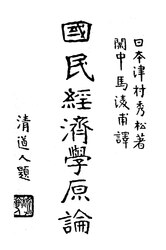File:NLC511-03003175-66627 國民經濟學原論.pdf

Original file (864 × 1,302 pixels, file size: 76.07 MB, MIME type: application/pdf, 882 pages)
Captions
Captions
Summary[edit]
| 國民經濟學原論
( |
||||||||||||||||||||||||
|---|---|---|---|---|---|---|---|---|---|---|---|---|---|---|---|---|---|---|---|---|---|---|---|---|
| Author |
日本津村秀松 |
|||||||||||||||||||||||
| Title |
國民經濟學原論 |
|||||||||||||||||||||||
| Publisher |
群眾書社·上海 |
|||||||||||||||||||||||
| Description |
目錄 |
|||||||||||||||||||||||
| Language | Chinese | |||||||||||||||||||||||
| Publication date | December 1915 (民國四年) | |||||||||||||||||||||||
| Source |
institution QS:P195,Q732353
(民國文獻) |
|||||||||||||||||||||||
| 主題 InfoField | 國民經濟;經濟學 | |||||||||||||||||||||||
Licensing[edit]
This image is in the public domain because it is a mere mechanical scan or photocopy of a public domain original, or – from the available evidence – is so similar to such a scan or photocopy that no copyright protection can be expected to arise. The original itself is in the public domain for the following reason:
This tag is designed for use where there may be a need to assert that any enhancements (eg brightness, contrast, colour-matching, sharpening) are in themselves insufficiently creative to generate a new copyright. It can be used where it is unknown whether any enhancements have been made, as well as when the enhancements are clear but insufficient. For known raw unenhanced scans you can use an appropriate {{PD-old}} tag instead. For usage, see Commons:When to use the PD-scan tag. |
| This image contains digital watermarking or credits in the image itself. The usage of visible watermarks is discouraged. If a non-watermarked version of the image is available, please upload it under the same file name and then remove this template. Ensure that removed information is present in the image description page and replace this template with {{Metadata from image}} or {{Attribution metadata from licensed image}}.
Caution: Before removing a watermark from a copyrighted image, please read the WMF's analysis of the legal ramifications of doing so, as well as Commons' proposed policy regarding watermarks. If the old version is still useful, for example if removing the watermark damages the image significantly, upload the new version under a different title so that both can be used. After uploading the non-watermarked version, replace this template with{{Superseded|new filename|version without watermarks}}.Bahasa Indonesia ∙ italiano ∙ eesti ∙ sicilianu ∙ Deutsch ∙ català ∙ magyar ∙ čeština ∙ română ∙ español ∙ português ∙ English ∙ hrvatski ∙ Plattdüütsch ∙ français ∙ Nederlands ∙ polski ∙ galego ∙ slovenščina ∙ suomi ∙ svenska ∙ Ελληνικά ∙ беларуская (тарашкевіца) ∙ български ∙ македонски ∙ русский ∙ українська ∙ മലയാളം ∙ ไทย ∙ 日本語 ∙ 中文 ∙ 中文(简体) ∙ 中文(繁體) ∙ עברית ∙ العربية ∙ فارسی ∙ +/− |
File history
Click on a date/time to view the file as it appeared at that time.
| Date/Time | Thumbnail | Dimensions | User | Comment | |
|---|---|---|---|---|---|
| current | 05:15, 26 April 2023 |  | 864 × 1,302, 882 pages (76.07 MB) | PencakeBot (talk | contribs) | Upload 國民經濟學原論 (1/1) by 日本津村秀松 (batch task; nlc:data_511,03003175,66627; 民國文獻-PD2022.1; 國民經濟學原論) |
You cannot overwrite this file.
File usage on Commons
The following page uses this file:
Metadata
This file contains additional information such as Exif metadata which may have been added by the digital camera, scanner, or software program used to create or digitize it. If the file has been modified from its original state, some details such as the timestamp may not fully reflect those of the original file. The timestamp is only as accurate as the clock in the camera, and it may be completely wrong.
| Short title | 00000001 |
|---|---|
| Author | Administrator |
| Software used | IrfanView |
| Conversion program | ComSquare ImPDF Library v0.40 |
| Encrypted | no |
| Page size |
|
| Version of PDF format | 1.4 |






